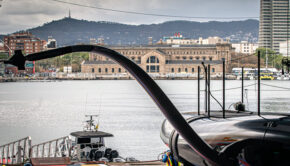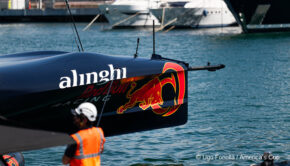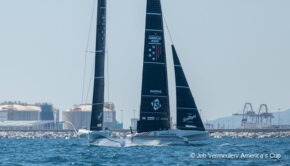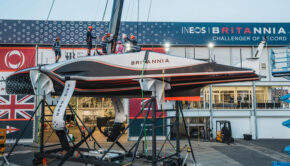Martin Whitmarsh, CEO Ben Ainslie Racing – One week in
Published on April 22nd, 2015
A week into his new job, the Chief Executive Officer of Ben Ainslie Racing talks about how he got here, and where he sees the company going.
Twenty five years ago, Martin Whitmarsh was a very young CEO, and founding director of Aerostructures Hamble Ltd. At the time, he was recruited to lead a company called McLaren International, whose business was racing Formula One cars, with just a hundred employees and a turnover of £19 million.
“It wasn’t a logical career move,” explained Martin Whitmarsh of the choice that defined the next 25 years of his life, “but it was an unavoidable opportunity that I had to go and do. Everyone thought I was mad to leave that job. Twenty five years later, when Whitmarsh left McLaren, the team were employing over 3,000 people and had a turnover of £650 million.
Another year on, and Whitmarsh finds himself at the head of another small racing organization, and sees exactly the same opportunity for growth. Martin Whitmarsh has always had a fascination with the collision between sport and engineering, sport and technology, but this is his first experience with sailing. “I’ve been on boats, I’ve owned some boats, but I’m not a sailor, I’ve not been near any of this before and I find that quite an exciting challenge,” he said.
Whitmarsh’s sporting interest started with bikes, not boats. He got into cycle racing while he was at school. “I think that sometimes I was more interested in the bikes than the riding. I got interested in weight saving and engineering. The equipment and the sport were interesting to me.” This was the 1970s though, and a career spent developing sporting technology would have seemed a bit far-fetched.
It’s tempting to say that the rest is history; Whitmarsh’s Formula One career is well known. The team won over 100 GPs and eight world championships while he was with them, a fifth of those while he was Team Principal.
“At McLaren, our first developments were largely technical, selling technical services, then we reached a point where the brand had become established in its own right. We’re in a brand conscious world and if you are going to sell to consumers as well as businesses you need the brand.”
Whitmarsh sees a similar path and opportunities for BAR. “The America’s Cup is a fantastic platform from which this team can demonstrate its capability in high technology, in performance, and in achieving things like cycle-time compression. I think we have a great opportunity to demonstrate how the technical endeavor associated with seeking to win the America’s Cup can be the catalyst of change in bigger technical organizations, can be a hotbed for technical development.
“I think it’s our job to ensure that we can capture the essence of that racing culture and tempo and speed of response, competitiveness and creativity. Those are things that are being searched for and worked hard for in big, big technical organizations. We have them, and that’s a valuable asset.”
Whitmarsh is also clear that the recent changes to the format of the Cup are all going in the right direction. “The Cup has been producing great contests for over 160 years, and has often relied on very wealthy benefactors. That’s great if you can find them, and great if you’ve got them, and we should be very grateful for the legacy that those people have funded and created. But if we’re going to have something with a little bit more continuity then we probably need to find a more consistent commercialization of the sport, with initiatives like the America’s Cup World Series.
“The problem with any form of entertainment, and that’s the business we’re in, is that people have an almost infinite number of choices in how they can spend their leisure time. What I saw in San Francisco was a truly exciting and televisual America’s Cup. And there are those who would say; great we can do it again in four years time. But I think it’s quite difficult to commercialize the sport and grow public interest in it when it only hits awareness once every four years.
Whitmarsh has only been with the team for a few days, but he’s had a chance to have a look around at what’s already been put in place. “I think we’re extraordinarily lucky to have a group of founding investors in this business and we’re very grateful to the investment that they have made. It’s a significant act of faith to believe that we can win the America’s Cup and build a sustainable organization. People within the team and the investors all believe in it, which is fantastic, now we have to go out and convince everyone else.”









 We’ll keep your information safe.
We’ll keep your information safe.